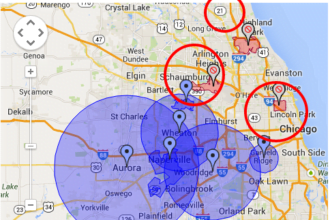State-of-the-art broadband services still don’t reach many parts of the African continent, especially rural villages. But one consumer technology is pervasive: cell phones.
State-of-the-art broadband services still don’t reach many parts of the African continent, especially rural villages. But one consumer technology is pervasive: cell phones.
According to the Cisco VNI Service Adoption Forecast, there will be 1.3 billion consumer mobile devices across the Middle East and Africa by 2016 – a billion of them being basic feature phones, not smartphones. At the same time, mobile video is expected to be the fastest-growing service in the region, with 184 million users projected by 2016.
Recognizing these trends, smart people across Africa and around the globe are asking themselves: How can we best use mobile video and cell phones to improve lives and economies in places that are otherwise cut off from Internet services?
A group of researchers in South Africa, led by professor Gary Marsden and graduate student Maletsabisa Molapo of the ICT for Development Research Center at the University of Capetown, are already putting one great idea into action. The team created software that allows health professionals to create educational videos for minimally trained community health workers so that they can provide better and safer care in their home villages.
 I spoke with Ms. Molapo, or “Tsabi,” via Skype in December.
I spoke with Ms. Molapo, or “Tsabi,” via Skype in December.
“In most developing countries in Africa, you find that in most rural villages, there are very few health facilities and very few health professionals,” she says. “So the government and NGOs pick women from villages and train them to act as the doctor or nurse for their village. These are normal people with no formal medical education, who receive training, maybe on a monthly basis, to care for people in their villages.
“The challenge over the years has been that most of these women are textually illiterate. So how can we give them information on, say, pregnancy or issues of maternal health, when they can’t read written information? Also, how can we give people information in a way that will stick, where they won’t forget it, and as a result, end up making mistakes?”
Educating with Video
 Tsabi’s team came up with a unique answer to these challenges: using video content that can be stored and played out on mobile phones. The solution addresses not only the literacy barrier, it provides a resource that health workers can continually refer to in their home villages, long after a training session.
Tsabi’s team came up with a unique answer to these challenges: using video content that can be stored and played out on mobile phones. The solution addresses not only the literacy barrier, it provides a resource that health workers can continually refer to in their home villages, long after a training session.
Here’s how it works: Health workers at a larger medical facility install the software on any Windows PC with a microphone. They can then create their own videos, which are effectively slide shows with a voice over, to address any health topic relevant to their communities. can be stored and played out on mobile phones. The solution addresses not only the literacy barrier, it provides a resource that health workers can continually refer to in their home villages, long after a training session.
“Let’s say a midwife wants to train bed attendants on the subject of measles. She can find a photo of a child with measles, and record a voice over saying, ‘If an infant has these kinds of pimples over her skin, that child should be rushed to the hospital.”
Health professionals can download images from the web or take their own photos and videos using cell phone cameras. The software converts the presentation to MP4 format – the most lightweight video format – so that it can be stored and played on virtually any basic cell phone. When women from the surrounding villages come into the medical center for their monthly training, the videos are transferred to their cell phones via Bluetooth.
Localizing Content
One of the most powerful aspects of the program is that it allows local users to develop their own content, customized specifically for the people and problems of the communities they serve.
“In most health education programs, content is produced on an international or national scale,” says Tsabi. “What we discovered is that every village and community has a specific and unique information need. For example, certain villages have misconceptions about HIV that are different from the misconceptions of the neighboring village. The core of our model is to allow the local professionals who work within those communities to create content by themselves, which ends up being very locally relevant because it is locally produced.”
Since the program launched, community health workers are now approaching the health professionals and asking them to create videos on specific topics relevant to their villages. Village health workers are also using the videos to educate their own patients.
“In many African countries, many people still die of tuberculosis, and unfortunately, many people refuse to go for testing because they associate tuberculosis with witchcraft,” says Tsabi. “Even when people are infected, they often refuse to take medication because they have the misconception that the medicine will give them HIV.
“One community health worker had a patient who was coughing and exhibiting all the symptoms of tuberculosis, but he refused the test for it. So the health professionals made a video showing a person with tuberculosis, highlighting how coughing sends germs out into the air. When the gentleman saw the video, that image struck him. It got him thinking that, ‘Oh, if I’m infected, when I cough I could infect my own children.’ Because of that, he finally went in for testing.”

Expanding the Program
So far, Tsabi’s team has worked with one medical center in Lesotho, which provides monthly training for 35 community health workers. In the coming year, however, Tsabi and Professor Marsden plan to expand to three or four more medical centers in Lesotho, as well as to a facility in Sierra Leone. (In fact, the team originally conceived the project specifically for Sierra Leone, which has the highest incidence of maternal mortality in the world.)
Tsabi’s team is also exploring non-healthcare applications. For example, they are now working with a driving school in Lesotho to help them create educational videos for their students, many of whom cannot read the school’s education manuals, which are mostly in English. And it’s easy to imagine many other areas where this technology could make a difference.
Tsabi will complete her masters degree in February, and then move to Lesotho to administer the program there. Kudos to her and Professor Marsden, and the rest of their team, for creating such a fantastic program. I can’t wait to follow their progress.
To read other posts in this exclusive ongoing series, please visit the Mobile Health Around the Globe main page. And if you have a Mobile Health Around the Globe story to tell, please post a comment below or email me at joan@socialmediatoday.com Thanks!









